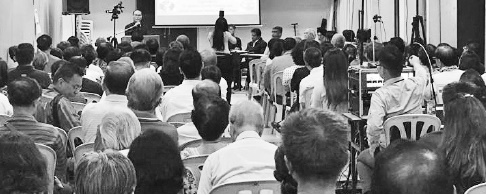Malaysia’s death penalty laws have not succeeded in deterring serious crime, according to professionals of both law and faith, when speaking on the topic during a forum on October 29. Organised by the Catholic Lawyers Society and the Church of St Ignatius, the discussion, entitled Death Penalty: Is it a Deterrent? saw four speakers discuss the issue from both legal and religious standpoints.
The four speakers were YA Datuk Mah Weng Kwai, former Court of Appeal Judge, YA Datuk Jagjit Singh, former Sessions Court Judge and Deputy Public Prosecutor, Prematilaka Serisena of Sasana Abhiwurdhi Wardana, Buddhist Society, and Fr Michael Chua, Chancellor of the Archdiocese of Kuala Lumpur and Parish Priest of the Church of Jesus Caritas. The speakers addressed the audience who came from all walks of life and across all professions. From a legal perspective, the speakers agreed that the death penalty does not meet its aim of deterring crime, as crime statistics have seen an increase in Malaysia throughout the years.
Datuk Mah shared that according to the statistics of the Royal Malaysian Police, from January 2014 until October 2017, a total of 702,319 individuals were detained for trafficking and possessing drugs. He added that during the same time period, 21,371 arrests were made under Section 39B of the Dangerous Drugs Act 1952 – for which the mandatory death sentence is applicable. It was contended by both Datuk Mah and Datuk Jagjit that there has been no concrete or empirical proof that the death penalty is effective in deterring crime, adding that the number of drug-related murders and attempted murders have increased.
Datuk Mah added that the law has not had the effect that Parliament had intended when it was passed, and there are other social and legal mechanisms that can be used to discourage individuals from committing serious crimes. Of late, Malaysian communities have been abuzz with opinions on capital punishment and the death penalty, following an announcement by the Minister in the Prime Minister’s Department, Datuk Liew Vui Keong(who is also the de facto Law Minister) on October 10 this year heralding the abolishment of all death penalty laws in the country – a Bill which he said should be tabled at the next Parliamentary sitting. He added that there will be a moratorium on all executions until then.
The nation’s current premier, Tun Dr Mahathir Mohamed, had also made a promise to abolish the death penalty provisions, a promise which was also part of the current Pakatan Harapan Government’s Manifesto. Malaysia is currently one of the 56 countries in the world that retain the death penalty by law, according to Amnesty International.
Dubbed as being “inhumane” and propagating the idea of “an eye for an eye” the draconian punishment has been receiving opposition from both local and international human rights groups alike, local politicians, as well as the Malaysian Bar.
In Malaysia, death penalty sentences are heard only in the High Court, by a single Judge, and can be either mandatory or discretionary. Mandatory death sentences are imposed for offences such as murder and the trafficking of dangerous drugs under the Dangerous Drugs Act 1952, as mentioned earlier.
Discretionary death sentences, which are imposed at the discretion of the Judge, are for offences such as gang robbery with murder under Section 396 of the Penal Code, among others. Offences carrying the death penalty are not bailable, which means the accused will remain in police custody until their sentence is carried out.
Both Datuk Jagjit and Datuk Mah explained that the death penalty in Malaysia is carried out in secret.
The offender’s lawyers or families are not informed of their forthcoming execution, much to the chagrin of human rights organisations, as this practice is in direct contravention of international standards.
From a religious standpoint, the concept of rehabilitation is prioritised, instead of retribution.
According to Prematilaka Serisena, Buddhism teaches that all life is precious, and should be spared including animals and insects.
Hatred is not overcome with hatred, and so the concept of retributive justice is ineffective in overcoming the occurrence of criminal activities.
Moving forward, abolishing the death penalty in Malaysia would be a step in the right direction for human rights in Malaysia and for respect for the right to life, which is enshrined in Artilce 5(1) of the Malaysian Federal Constitution.
Article reproduced from Herald Malaysia online
 SH of Jesus 58 cm
2 × RM 328.90
SH of Jesus 58 cm
2 × RM 328.90  Medallion Crucifix 3879
2 × RM 2.80
Medallion Crucifix 3879
2 × RM 2.80  Medallion Crucifix 5309
2 × RM 3.80
Medallion Crucifix 5309
2 × RM 3.80  Yesus Cinta Saya
2 × RM 9.50
Yesus Cinta Saya
2 × RM 9.50  Plaque Mary(M)
2 × RM 8.80
Plaque Mary(M)
2 × RM 8.80  Benedict Hanging Crucifix II 18.5 cm
2 × RM 14.00
Benedict Hanging Crucifix II 18.5 cm
2 × RM 14.00 
 SH of Jesus 58 cm
SH of Jesus 58 cm  Medallion Crucifix 3879
Medallion Crucifix 3879  Medallion Crucifix 5309
Medallion Crucifix 5309  Yesus Cinta Saya
Yesus Cinta Saya  Plaque Mary(M)
Plaque Mary(M)  Benedict Hanging Crucifix II 18.5 cm
Benedict Hanging Crucifix II 18.5 cm 
